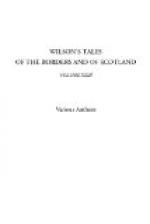“Big with the fate of Thomas and his mother.”
He was to preach his trial sermon; and where? In his own parish—in his native village! It was summer, but his mother rose by daybreak. Her son, however, was at his studies before her; and when she entered his bedroom with a swimming heart and swimming eyes, Thomas was stalking across the floor, swinging his arms, stamping his feet, and shouting his sermon to the trembling curtains of a four-post bed, which she had purchased in honour of him alone. “Oh, my bairn! my matchless bairn!” cried she, “what a day o’ joy is this for your poor mother! But oh, hinny, hae ye it weel aff? I hope there’s nae fears o’ ye stickin’ or using notes!” “Dinna fret, mother—dinna fret,” replied the young divine; “stickin’ and notes are out o’ the question. I hae every word o’ it as clink as the A B C.” The appointed hour arrived. She was first at the kirk. Her heart felt too big for her bosom. She could not sit—she walked again to the air—she trembled back—she gazed restless on the pulpit. The parish minister gave out the psalm—the book shook while she held it. The minister prayed, again gave out a psalm, and left the pulpit. The book fell from Mrs. Jeffrey’s hand. A tall figure paced along the passage. He reached the pulpit stairs—took two steps at once. It was a bad omen; but arose from the length of his limbs—not levity. He opened the door—his knees smote upon one another. He sat down—he was paler than death. He rose—his bones were paralytic. The Bible was opened—his




